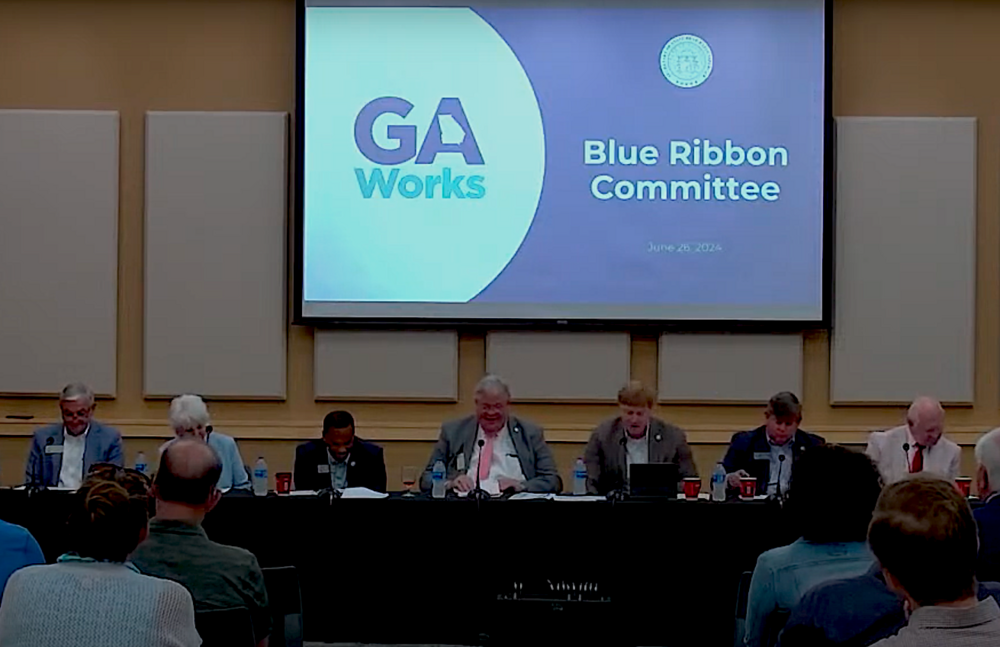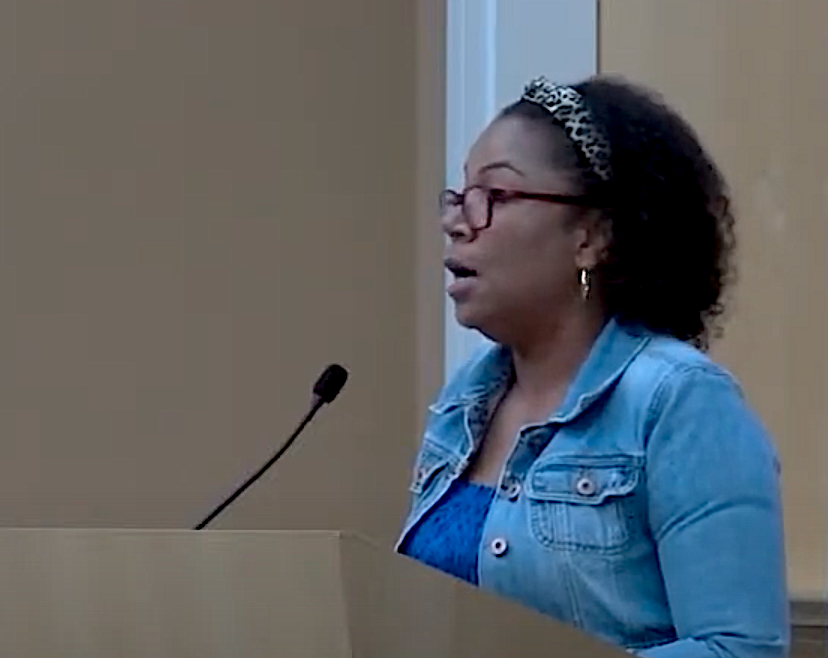
Caption
The Blue Ribbon Committee of the Georgia Legislature met in Macon in June 2024 to discuss making it easier to obtain certain licenses in the state.
Credit: Screenshot
LISTEN: Changes are coming for Georgians frustrated by the state’s professional licensing system. GPB's Donna Lowry has more.

The Blue Ribbon Committee of the Georgia Legislature met in Macon in June 2024 to discuss making it easier to obtain certain licenses in the state.
Changes are coming for Georgians frustrated by the state’s professional licensing system, where red tape has led to job shortages in vital sectors such as nursing, skilled contracting, and teaching.
On July 1, a new law, House Bill 579, will allow qualified individuals to enter the workforce faster.
As described by Secretary of State Brad Raffensperger's office, "Key provisions of HB579 include allowing administrative issuance of licenses for all Professional Licensing Boards including license applications, renewals, and reinstatements directly - bypassing lengthy board review processes for qualified applicants. The legislation also provides temporary licenses for qualified applications, extends the grace period for expired licenses, and allows the Governor to remove board members that aren’t up to the challenge."
At the Georgia Joint House/Senate Blue-Ribbon Committee on Investigating Licensing Issues last June in Macon, April Williams told lawmakers she moved to Georgia with a master's degree in nursing. But she faced frustrating obstacles to becoming licensed as a registered nurse.
"I have a family to feed, I have a mortgage to pay," Williams said in her testimony at the podium. "I went to school the right way. I didn't cheat my way through anything. So now, you know what I have to do? I have to go back to California and work on a contract assignment."
Colleen Howard also spoke before the panel. She holds a master's degree as a marriage counselor and family therapist, and she, too, struggled to get a license to practice here.
Overall, this process is extremely frustrating," Howard said. "And entirely too difficult for someone who went to school in a state other than Georgia."

April Williams, speaking in 2024, said she hopes a new law will make it easier to become a licensed nurse in Georgia.
The consumer group Georgia Watch has heard many similar stories. Deputy director Natasha Taylor said long delays in obtaining licenses through the professional licensing boards discourage some people from moving to Georgia.
"It definitely can discourage people from moving into the parts of our state where care is needed most," Taylor said. "The boards prioritize making sure that all of the requirements are met for professionals and making sure that people are thoroughly trained and have, you know, their core competencies of what they need to do their job. If a therapist is moving to Georgia, they might wait months to start working, which leads to families having fewer options for mental health support. If a rural hospital can't hire a nurse because their license is stuck in limbo, that impacts patient care."
The Professional Licensing Boards Division of the Georgia Secretary of State's Office oversees 42 licensing boards that set and maintain specific educational, experience, and competence standards for various professions.
Georgia requires licenses for certain medical professionals, engineers, electricians, plumbers, contractors, accountants, and anyone else with professional standards monitored by a licensing board.
Changes will come when new laws take effect July 1.
Rep. Matt Reeves (R-Duluth) spearheaded the bill to help streamline the licensing process.
"Over the years, professional licensing had become bureaucratic," said Reeves. "There were a lot of customer service issues, and modernization steps that were needed. And so there was a blue ribbon panel. They came away with some very good insights from small business people and hardworking individuals about how to make the state government more customer-friendly. And as Gov. [Brian] Kemp said, professional licensing in the state of Georgia should serve working people rather than the other way around."
Taylor of Georgia Watch explained that the new legislation will eliminate the lengthy waiting process for professional boards to convene.
"You have to wait until the board meets to go ahead and approve all of the licenses," Taylor said of the current process. "So, this bill allows staff to approve applications when all qualifications are met instead of waiting for the full board to meet."
Reeves said technology upgrades and reducing red tape will help hundreds of thousands of Georgians.
"Rather than putting all of the work on the person out in the workforce, let's have state government use technology to be more efficient and make it easier to obtain and renew professional licenses to serve our workforce needs," Reeves said.
Natasha Taylor agrees.
"This is one of those bills that does not make big headlines, but it makes a big difference in people's lives," Taylor said.
Another bill, sponsored by Republican Rep. John Carson of Marietta, will make getting a license to become a Certified Public Accountant easier.
That's good news for Rep. David Wilkerson (D-Powder Springs), a longtime CPA who wants more people to enter the profession.
"When I first started back many years ago, there was a pathway," Wilkerson said, "You get four years of college, pass the exam, two years' work experience, you've got your CPA. Over the years, states added a fifth year of college, which put it out of reach for a lot of students. A lot of students either decided because of financial reasons or because they just wanted to get in the workforce that they were not to pursue the CPA. So what this legislation does is give that second opportunity: another pathway — an additional pathway — to go back to the four years of college and two years' work experience."
Frustrations in getting professional licenses have now sparked change — and that's expected to bolster the state's workforce.